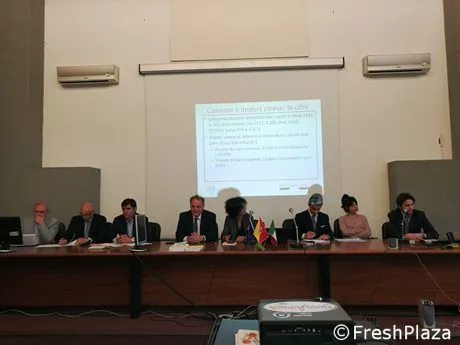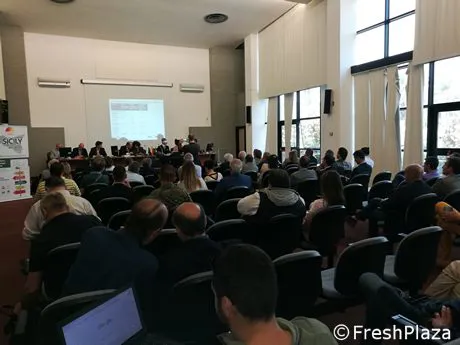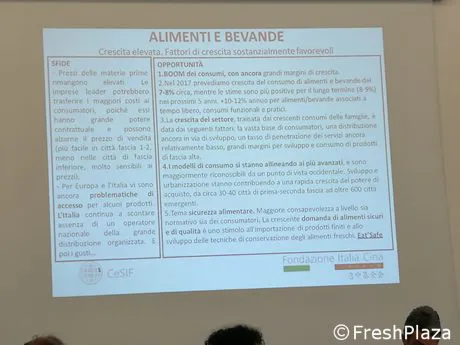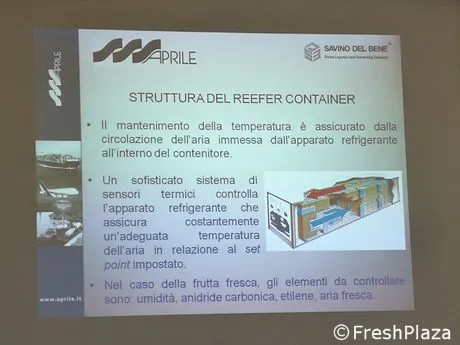
Left to right: D'Anna, Di Giovanni, De Vecchi Bellini, Cracolici, Argentati, Toti, Amodei, Rossi.
There is a lot of room in China for Sicilian citrus fruit (bearing in mind transit time is 40 days). The opening of this market is a great opportunity but operators need to be prepared, know the bureaucratic and administrative practices, obtain brand protection and Pdo/Pgi certifications, choose the right target, establish distribution agreements and undergo all phytosanitary checks necessary.

"It is always difficult to enter new markets, this is why we have invited experts who have been operating on the Chinese market for years as well as the technicians who have negotiated the phytosanitary checks," explained Federica Argentati, President of Distretto Agrumi di Sicilia.
Video interview with Federica Argentati
Argentati also hinted at rural tourism, "which is what the Vie della Zagara project aims at, in cooperation with the Pdo and Pgi consortia and the Gusto di Campagna associations. It is another great opportunity and we must take advantage of it."
Alberto Rossi, marketing manager and analyst for Centro Studi per l'Impresa della Fondazione Italia Cina, illustrated the data of the Fondazione Italia Cina Annual Report. It emerged that the Italian produce is popular because of its high quality and that there is now more attention to food security and marks. In addition, in 2020, e-commerce is expected to be worth $180 billion."
Chiara Amodei, corporate manager for central and southern Italy for the Bank of China, talked about the increasing Chinese trend of consuming high-quality products. The Bank of China supports Italian companies wishing to operate on the market thanks to its widespread network.

Regional politics intervened to illustrate some of the technical-bureaucratic problems to address when obtaining the necessary authorisations.
"The Distretto Agrumi di Sicilia is doing a great job. The opening of a market such as the Chinese one means Sicilian production must be well-organised. It can only be successful if it works as a system," commented Antonello Cracolici, Regione Sicilia councillor for Agriculture.
Video interview with Assessore Cracolici
"We recommend approaching the market bearing in mind company size as well as the time and resources that must be dedicated to inter-nationalisation. You must investigate possible partners or interlocutors to understand their strength and reliability."
Laura Formichella talked about intellectual property, as the Chinese law allows anyone to register a brand, even without being the owner. "The Chinese law provides two levels of protection for brands and Pdo/Pgi certifications. Our recommendation is to seek protection before approaching the market. Of course it is easier to obtain AQSIQ certification for those already in possession of Pdo and Pgi certifications. The Chinese certification is essential also price-wise, as a study showed registered or certified products saw an increase in price between 300 and 2000%."
Video interview with Laura Formichella
Cristiano Di Giovanni from Savino del Bene, global logistic operators, talked about "the importance of logistical planning and support for bureaucratic matters concerning transport and packaging, which must contain a whole series of information, including the orchard's registration number." At the moment, oranges can only be transported by sea and only from some Italian ports.

Stefano De Vecchi Bellini, founder member and owner of the Gamos Group trading company (established in Shanghai in 2014), shared his experience as a food & beverage trader. Rosario D'Anna, executive at the Assessorato Agricoltura Regione Sicilia – Servizio 4 Fitosanitario, discussed the matter of phytosanitary checks in detail.
"Negotiations started in 2009 and an agreement was finally reached last February. In March, the Regione issued a notice for companies interested in starting exports in 2017/18. Only two replied, because the agreement is very strict. In addition, our phytosanitary service must monitor the entire production, from blossoming to harvesting. We might seem strict, but it's only because we must respect the protocol. Companies must implement integrated control practices in compliance with the regional specification."
Salvatore Torrisi, president of A.A.T. Oranfresh, concluded by saying "we were the first to export our citrus fruit juicers to China 5 years ago and have exported over 700 so far. The Chinese market is immense and very complicated so it's better to be prepared."
